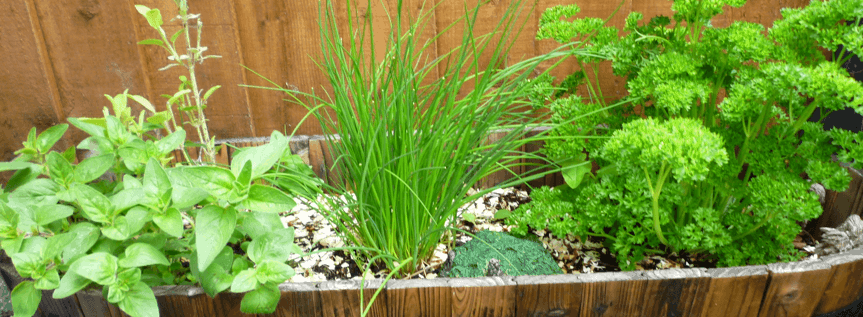
Whether your urban garden takes up your whole balcony or just your windowsill, incorporating herbs will provide a quick and easy source of culinary enhancement that’s way more satisfying than store bought. On top of that, most herbs produce abundantly all season long and fit well in a container, flower garden, or vegetable garden. Naturally, herbs will flourish best in sunlight, but many of the more popular herbs like parsley and chive will tolerate partial shade and produce well.
Some culinary herbs we recommend for your urban garden:
- Basil: As well as being a kitchen essential, Basil is regarded as one of the healthiest herbs around. Enriched with vitamin K, copper, and calcium, basil requires 6-8 hours of sunlight a day and is a great addition to any urban herb garden.
- Chives: Similar to basil, chives are arguably a cooking essential. If French cuisine is the name of the game, look no further! With a hybrid garlic and onion aroma, they’re not only aromatic, they’re also easy to grow. Though they prefer full sun, they will grow in partial shade and still do wonders.
- Cilantro: Cilantro’s taste is best described as a promise of lively fresh flavor. As long as you’re not affected be the genetic soap taste it strangely offers some people, Cilantro will definitely be of benefit to your next dish. For optimal growth, make successive sowings every 2 to 3 weeks starting in late spring.
- Mint: Mint carries the chemical menthol, which can be a treat for your taste buds. Use just the right amount and you’ll add a bit of fresh bite to a dish. Similar to basil, mint is a health nut’s friend and is rich in manganese, copper, and vitamin C. For optimal growth simply cut the stems one inch from the ground before flowering. As an added bonus, you can pick mint leaves whenever you need them!
- Oregano: Oregano offers a special savor to almost any dish, but is most commonly used to compliment tomatoes, eggplant and meat. It will also take any pizza and pasta to the next level. Oregano does not have a strict growth cycle, so you can harvest the leaves as you need them.
- Thyme: Thyme brings an intense kick to foods, and should be used sparingly. To unlock the full flavor of thyme it is best to add at the last moment of a recipe, because the oils are easily evaporated. Thyme is another ingredient that will help bring your specialty pizza or pasta to the next level, and gives your morning omelet a pleasant aroma. Although it’s not as beneficial to your health as basil or mint, thyme has several surprising medicinal uses. It can be used as eyewash, a hair rinse to prevent dandruff, or a tonic to stimulate the nervous system. Believe it or not, it’ll even alleviate nervous disorders such as nightmares, depression, insomnia and melancholy. Time to plant some thyme!
Dill, Lavender, and Parsley are also fairly easy to grow, and will make spectacular additions to your urban herb garden. For more information and other inspiring ideas, head to our store or deeper into the Inspiration Garden. Happy gardening!

